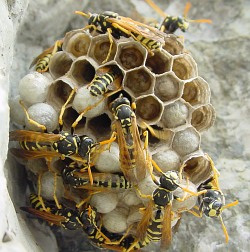Social elites can emerge naturally when interaction in networks is restricted (doi:10.1093/beheco/art085)
Lay Summary:
"The social world of many mammals and birds is highly structured, with interactions limited to a small number of socially or spatially close individuals, thus creating a natural layering to social networks. We use an agent based model to explore the social and fitness consequences of network structuring and show that stratification and elite formation emerge naturally under these circumstances, but at a cost of reducing the overall ecological efficiency of the system."
Abstract:
"Animal (and human) societies characterized by dominance hierarchies invariably suffer from inequality. The rise of inequality has 3 main prerequisites: 1) a group in which inequality can emerge, 2) the existence of differences in payoff, and 3) a mechanism that initiates, accumulates, and propagates the differences. Hitherto, 2 kinds of models have been used to study the processes involved. In winner–loser models of inequality (typical in zoology), the 3 elements are independent. In division-of-labor models of inequality, the first 2 elements are linked, whereas the third is independent. In this article, we propose a new model, that of synchronized group action, in which all 3 elements are linked. Under these conditions, agent-based simulations of communal action in multilayered communities naturally give rise to endogenous status, emergent social stratification, and the rise of elite cliques. We show that our 3 emergent social phenomena (status, stratification, and elite formation) react to natural variations in merit (the capacity to influence others’ decisions). We also show that the group-level efficiency and inequality consequences of these emergent phenomena define a space for social institutions that optimize efficiency gain in some fitness-related respect, while controlling the loss of efficiency and equality in other respects."
http://beheco.oxfordjournals.org/content/early/2013/10/21/beheco.art085.full.html?papetoc



 RSS Feed
RSS Feed
